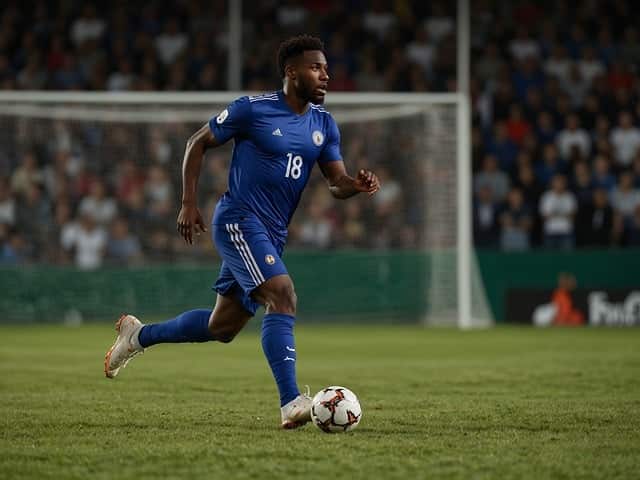Professional football is a world where precision, passion, and perseverance intersect. For fans, it’s an exhilarating game full of moments of brilliance, while for players, it’s a relentless pursuit of excellence. The difference between a good player and a great one is often found in the training and strategy that define their careers. But it’s not all about what happens on the pitch; the mental and physical preparation behind each match is as critical as the tactics and skills employed during the game.
In this article, we’ll dive into the inner workings of professional football, exploring elite football training, the intricacies of team dynamics, match preparation, and the often unseen side of the sport—mental fortitude. We’ll also touch on the impact of football contracts and the strategies that make pros the best in the world. If you’re curious about how professional football players go from aspiring talents to elite athletes, you’re in the right place.
1. The Backbone of Elite Football: Training
Football is not just a game—it’s a craft. Every professional football player starts with the fundamentals, but it’s the elite football training that takes them to the top. You may have seen your favorite players dribble, pass, or shoot with breathtaking ease, but behind those moments of brilliance lies countless hours of hard work.
Personal Insight:
I once spoke with a former professional footballer who said, “People think we just show up on match day and perform. The reality is, 90% of what we do is unseen—it’s the hours on the training ground, refining what we do best and adding new elements to our game.”
The Physical Aspect: Strength and Endurance
To perform at the highest level, professional football players undergo a rigorous physical conditioning routine. This includes strength training, cardiovascular fitness, and agility drills. The demands on a player’s body are immense, and without a robust fitness regimen, even the most talented individuals would struggle to keep up with the physical nature of professional football.
Speed and endurance are paramount. Consider a winger racing down the sideline to deliver a cross or a striker sprinting towards goal—these actions require not only speed but also stamina, often with little to no rest in between.
The Mental Side: Focus and Resilience
Equally important is the mental preparation. Players are put through psychological conditioning to help them deal with the pressure, maintain focus, and recover from setbacks. Mental resilience is as much a part of elite training as technical skills and physical fitness.
The ability to stay focused during high-pressure moments, like taking a penalty in the dying minutes of a game, is often what separates the world-class players from the rest.

2. Tactics for Pros: Team Strategy and Individual Roles
Professional football is about more than just individual skill. It’s a team sport where each player’s role and the tactics employed by the coach can make or break a match. A well-drilled team is far more dangerous than a group of talented individuals playing without coordination.
Tactical Awareness
In the modern game, tactics evolve constantly, but some strategies have remained crucial throughout history. For example, the 4-3-3 formation is one of the most commonly used, with its balance between attack and defense. It allows for an attacking threat while maintaining defensive stability. The 4-4-2 formation has also remained a staple in football, offering a strong midfield presence and solid defensive coverage.
Tactics for professionals go beyond formations, though. Coaches meticulously plan every aspect of play, from set pieces to counter-attacks. A successful professional football team knows when to press high, when to sit back, and how to control possession—all tactics that require detailed preparation.
Personal Story:
I remember watching an old match between two top clubs, where one team completely outplayed the other by executing a flawless counter-attacking strategy. The attacking team weathered wave after wave of pressure, sitting deep in their own half, and then, at the right moment, sprang forward with lightning-fast passes. The way they switched from defense to attack in the blink of an eye was a masterclass in football tactics.
Team Dynamics
Team dynamics are the unseen force driving professional football. It’s not enough to have world-class players—you need players who communicate, trust each other, and work together. The most successful teams have a sense of unity and purpose, often defined by the coach’s ability to inspire and direct players, both on and off the pitch.
The best teams play as a unit, and their success is often the result of months (sometimes years) of honing their tactical understanding. A defensive unit that understands when to press or drop back can shut down the most potent attacks. Meanwhile, attacking players must be in sync to create goal-scoring opportunities.
Personal Insight:
I’ve witnessed the magic that comes from a well-coordinated team on a local level. I once played on a team where we trained relentlessly to develop team chemistry. We became so in tune with each other that, during matches, it felt as if we could read each other’s minds. There’s no better feeling than knowing exactly where your teammate will be before they even have the ball.
3. Match Preparation: More Than Just Training
While training is crucial, match preparation is where everything comes together. Professional players dedicate significant time to studying their opponents, working on game strategies, and fine-tuning their tactics in relation to the upcoming match.
Scouting and Analysis
Before any match, teams conduct a thorough analysis of their opponents. This includes watching match footage, understanding the opponents’ key players, and devising strategies to exploit weaknesses. A football team’s coaching staff might even analyze the opposing team’s training sessions to gain insights into their tactics.
Personal Story:
During my time watching the game closely, I recall how one underdog team, after studying their opponent’s patterns, managed to shock a powerhouse club. By anticipating the opponent’s key attacking moves, they were able to shut down the threat almost completely, leaving the bigger club frustrated and eventually beaten.
Physical and Mental Prep
Before stepping onto the field, players go through a physical warm-up, which is crucial for injury prevention. Stretching, light jogging, and drills to get the muscles primed for the game are just the start. Players also spend time mentally preparing for the match by focusing on their roles, visualizing key moments, and calming their nerves.
4. Football Contracts: The Business of the Game
While we all love watching football, there’s a business side to the sport that shapes players’ careers. Football contracts determine much of a player’s life both on and off the field.
A contract isn’t just about salary—it also impacts a player’s transfer possibilities, performance bonuses, and even the security of their future. Players with high-profile contracts have the luxury of guaranteed stability, while others might constantly be worried about securing their next deal.
The Balance of Football Contracts
In many cases, football contracts are tied to performance goals—how many goals scored, matches played, or titles won. Contracts can offer great rewards but can also be a burden if a player fails to meet expectations. Negotiating a good contract, with incentives and security, is an art in itself.
Reflection:
The business side of football is often overshadowed by the on-field drama, but the pressure to perform, not just for your team but also for your career, is immense. A player’s success is not always solely dependent on talent, but also on navigating this complex landscape of contracts, negotiations, and opportunities.
5. Mental Preparation: The Silent Game-Changer
While football may seem like a physical sport, the mind is arguably just as important. Mental preparation is something many aspiring players overlook, but it’s often what separates those who have a great career from those who burn out too early.
Top professionals like Cristiano Ronaldo and Lionel Messi have not only perfected their physical game but have developed an incredible mental fortitude. Whether it’s dealing with the pressure of being the last man to take a penalty or shaking off an early mistake, mental toughness is key.
Players who can handle pressure, keep a cool head in difficult situations, and stay focused on the game will always have an edge over those who let nerves take over.
Conclusion: The Path to Success in Professional Football
Success in professional football doesn’t happen overnight. It’s the result of hard work, strategic training, mental fortitude, and team dynamics. From the rigorous fitness routines to the tactical genius on the field, every aspect of a player’s career is meticulously crafted. Football is not just about kicking a ball; it’s about understanding the bigger picture, both on and off the pitch.
By focusing on these areas—training, tactics, match prep, and the business side—players can maximize their potential and leave their mark on the game. But as with any career, it’s not just about talent—it’s about determination, preparation, and, most importantly, a love for the game.



